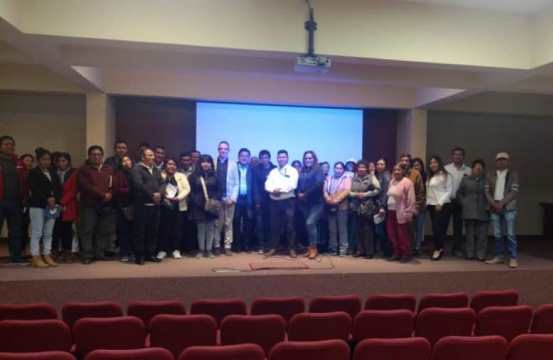Arequipa hosted a technical talk about natural additives for animal feed

On Saturday June the 8th the College of Public Accountants of the Peruvian city of Arequipa hosted an introductory technical session on the use of natural additives in animal feed, which was subsequently complemented by a session on biosecurity in animal production facilities. The first talk was given by the technical director of Biovet S.A., veterinarian David Díez, who was accompanied by engineer Hugo Patiño, from Adivet E.I.R.L., who led the specific section on dual farm cleaning and disinfection programs.
The event was organized by the feed producer Candia Nutrimentos E.I.R.L., who summoned more than 50 attendees from poultry, pig and guinea pig industries, the latter being of special importance in Peruvian national cuisine.
Natural additives: presentation of the pronutrient variety
Dr. Díez introduced the concept of natural additives for animal nutrition and health, for which pronutrients are amongst the greatest exponents. In this sense, pronutrients are presented as solutions to substances traditionally used in the prevention and treatment of diseases such as antibiotic growht promoters (AGP).
Adhering to the concept formulated by Dr. Gordon Rosen in the 1950s, a pronutrient is a micro-ingredient that added to feed in relatively small quantities is able to improve animal physiological functioning, increase intrinsic nutritional value and avoid the presence of pathogens. Pronutrients are complex molecules of botanical origin that regulate and stimulate metabolism without having pharmacological action. They may have activity on one or more organs and systems of the animal.
As Dr. Díez explained to the attendees in Arequipa, there are different types of pronutrients. The most prominent are intestinal conditioners, intestinal optimizers, immuno-boosters and feed optimizers, among others. In the words of Dr. Díez, the concept of pronutrient created “a lot of expectation that was reflected in questions of different kinds, through which attendees sought to adapt this type of product to the problems experienced in their farms.”
The case of the guinea pig
Guinea pig producers were especially interested in the use of natural additives to combat common challenges in the farming of a species that is particularly important in the Andean countries and, above all, in Peru.
The next day, Dr. Díez visited one of the most important guinea pig farms in the country where, together with different specialists from the region, he was able to make a more exhaustive study on the main challenges in the production of this species, being intestinal pathologies and Salmonellosis some of the most predominant.
For its prevention and treatment, Dr. Díez recommended the use of natural preservatives with bactericidal and fungicidal function for better feed preservation. In turn, they can also act as intestinal biocides when applied directly to feed or drinking water. At the same time, he also recommended the administration of additives rich in intestinal conditioning pronutrients. Due to their action in the improvement of digestive processes, they positively intervene in bettering animal nutrient absorption.
